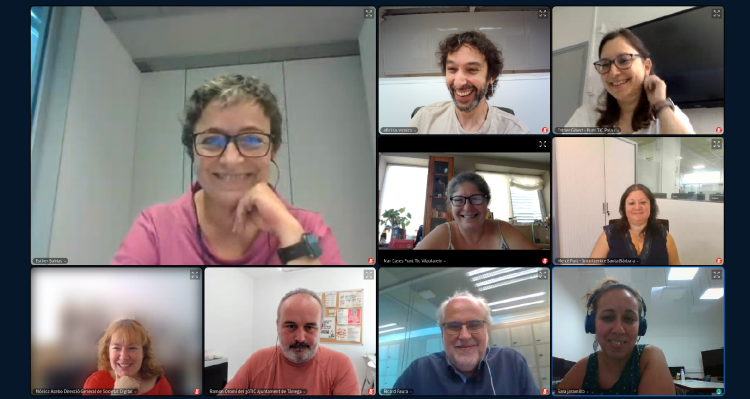Last Thursday, September 26, the Xarxa Punt TIC Network experienced a new virtual meeting. This time, the theme was the 'Més Digitals' program, which will promote the digital empowerment of more than 90,000 people through more than 9,000 courses that will be taught throughout the territory of Catalonia. The sixth virtual meeting of the year 2024 had about twenty participants, among them Esther Subias from the team of the Shock Plan against the Digital Divide of the Generalitat de Catalunya, who introduced the program 'More Digitals', financed by the Generalitat de Catalunya and the NextGeneration European funds and whose central objective is to accompany people with little digital knowledge in order to increase their digital rights.
The challenge of the 'Més Digitals' program is to train 90,295 people at risk of digital exclusion before June 2026, bearing in mind that a person at risk of digital exclusion is someone who has not achieved the minimum skills to develop in society. Unfortunately, financial resources are limited and the 'More Digital' program will focus on a part of the population. In this sense, the focus will be on people over 60 years of age, with the aim of impacting this 5% of the population of Catalonia. However, a certain percentage will be reserved for other groups and, along these lines, we are working with the Department of Justice and the Department of Social Rights on possible agreements and collaborations to reach other groups that often do not enjoy training options such as, for example, people in prisons, newly arrived people or people with a dependency situation. The aim of the 'Més Digitals' program is to open the door to curiosity and arouse the interest of the participants.
Next, Subias explained that 9,031 training proposals lasting fifteen hours would be promoted, face-to-face, free of charge and with three different options: 'Discover the digital world (level A)', 'We move through the digital world (level B)' and 'We enter the digital world (level C)'. The trainers will go to the territory and dynamize the training over the course of four to ten weeks, with one or two weekly sessions of two hours and small groups of five to fifteen people. Once completed, a certificate will be awarded.
Next, the possibilities of collaboration from the ICT Point Network were announced: dissemination and information to citizens, transfer of a space for training with the following characteristics: room equipped with tables and chairs for fifteen participants and a trainer, wifi connectivity, space to project a presentation and projector and screen, and recruitment and selection of specific groups. Although training is expected to begin in some territories during the month of November, the majority will start from January and in stages. Finally, the benefits for the community of the TIC Point Network were enumerated: consolidating the TIC Points as references in digital training in the territory, attracting new audiences to the TIC Points, and complementing or increasing the educational offer of the TIC Points. Finally, a round of questions was opened, where the participating people formulated questions and comments in relation to the transfer of the spaces, the importance of these initiatives to the populations of the rural environment or the recruitment of the participating people, among others.
Interested persons can sign up through an interest registration form.



